|
|
|
|
|
|
 |
|
|
|
IAIE Publication

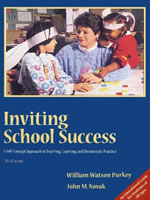 |
Inviting School Success
“Inviting School Success” is the foundational text for Invitational Education, providing in-depth information about the theory, it's goals, and application. This self-concept approach to school success provides a framework for positive communication and creates an environment built on trust, respect, optimism, care, and intentional practice. When implemented through the people, places, policies, programs, and processes of the school, it insures that all students and staff will realize their full potential and enjoy academic success in a joyful, collaborative learning environment.
It also offers strategies on how to overcome challenging situations by applying class-tested theory in the practice of everyday teaching to students of all ages. And now, this Third Edition presents even more ways to invite success through:
- A new chapter, “Inviting in the Rain,” with sage advice on how to create and maintain safe schools in dangerous times
- Suggestions for teachers on avoiding burnout and maintaining commitment
- A new chapter, “Blueprint for Creating Inviting Schools,” with strategies for building a school where all want to be and learn
- More guidance on how to invite involvement from students, parents, and the community
- New references to important research studies that support invitational theory
Price: HK $ 480 each |
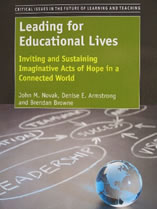 |
Leading for Educational Lives
Inviting and Sustaining Imaginative Acts of Hope in a Connected World
This book is written for the growing number of people (teachers, administrators, support staff, parents, and community members) throughout the world who wish to face the challenges of school leadership in ways that feel right, make sense, and contribute to sustaining defensible educational practices. Using and extending the evolving core ideas of the global inviting school movement, it provides a hopeful approach to educational leadership, management, and mentorship that combines philosophical defensibility, administrative savvy, and illustrative stories.
Price: HK $ 310 each |
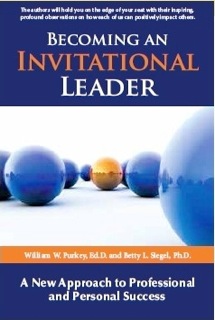 |
Becoming an Invitational Leader: A New Approach to Professional and Personal Success 2nd Edition
There is a great and pressing need for a special kind of leader who can be a force for positive change and can gain the voluntary and enthusiastic support of others. This leader bonds people together within a circle of optimism, respect, trust and intentionality. Becoming an Invitational Leader, by William Purkey and Betty Siegel meets this need. Becoming an Invitational Leader differs significantly from past leadership books and theories because of its six overarching principles: people are able, valuable, capable of responsibility, and should be treated accordingly; intentionally creating a culture of respect, optimism, and trust promotes positive change; leadership is a cooperative and collaborative alliance where everyone matters; human potential, always apparent, is always there, waiting for the invitation; this potential can be best realized by leaders who intentionally invite the process; motivation is intrinsic and Invitational Leaders work to unleash this energy. The power of Invitational Leadership can be monumental. Believing that people have within themselves vast resources of strength, courage, and self-actualization the Invitational Leader finds ways to invite others to share in the leaders' vision and look ahead to tomorrow's promise. |
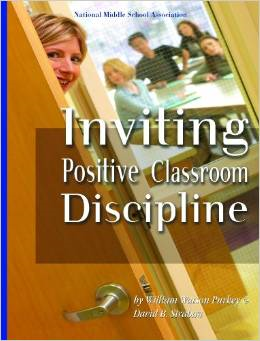 |
Inviting Positive Classroom Discipline (2002)
Invitational theory addresses the total educational environment and culture of the classroom and school, focusing on the people, places, policies, programs, and processes that constitute any school culture. Invitational teaching is a process for communicating caring and appropriate messages to nurture the realization of student potential as well as for identifying and changing those forces that defeat and destroy potential. Principles of invitational teaching include respect, trust, optimism, and intentionality. Applying this theory of invitational education to managing student behavior in middle schools, this book presents a color-coded approach to classroom management. The metaphor of blue and orange cards is used as a framework for describing the underlying positive and negative social processes that shape the school environment. The book provides examples to illustrate how teachers in a variety of settings have placed the invitational teacher theory into practice. The chapters of the book are: (1) "Invitational Teaching: A Color-Coded Approach to Classroom Management," presenting the basic concepts of invitational teaching; (2) "What Color Is Your Classroom?," presenting four levels of professional functioning; (3) "The Five Powerful Ps: Creating School Cultures That Promote Self-Discipline," showing how the dynamics of invitational teaching are stronger when supported by a school culture nurturing success and self-discipline; (4) "The Invitational Framework in Action," focusing on basic areas of the teacher's life where invitational teaching can be applied; (5) "Classroom Practices that Promote Self-Discipline," detailing the three-stage process of preparation, interaction, and follow-up; and (6) "An Invitational Approach to Conflict Management," describing inviting ways to manage conflict. (Contains 67 references.) (KB) |
 |
Teaching Class Clowns and What They Teach Us William Purkey, Corwin Press 2006 24.00
This first-of-its-kind resource shows educators how to teach these unique learners while also leveraging their humor to improve classroom management and student motivation |
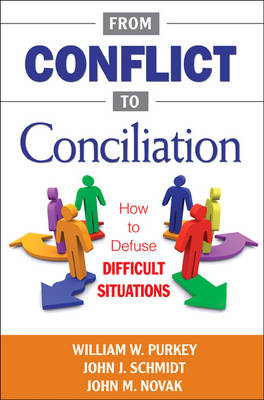 |
From Conflict to Conciliation William Purkey, John Schmidt, John Novak, Corwin Press, 2010 24.00
Conflict is inevitable, but educators can work together effectively if they understand how to defuse difficult situations before they escalate. This resource describes the Six-C process, a conflict resolution method that allows educators to take progressively more assertive steps as necessary to resolve disagreements. Based on research and easy to remember, this approach helps readers handle challenging situations using the least amount of time and energy. Illustrated with many examples and scenarios, the six steps are: Concern - identifying actionable concerns; Confer - expressing concerns in nonthreatening ways; Consult - reviewing and clarifying the situation collaboratively; Confront - considering consequences and giving clear warnings; Combat - taking sustained, logical action; and, Conciliation - mending the wounds and restoring relationships. Focused on preserving relationships while resolving disagreements, "From Conflict to Conciliation" can be used in any situation or setting, from the classroom to the community. |
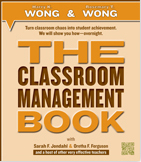 |
The Classroom Management Book Harry Wong
This is a solutions book that shows how to organize and structure a classroom to create a safe and positive environment for student learning and achievement to take place. It offers 50 procedures that can be applied, changed, adapted, and incorporated into any classroom management plan at any grade level.
The information is supplemented with 40 QR Codes that take the learning beyond the basic text.
As the companion book to The First Days of School, it takes one of the three characteristics of an effective teacher, being an extremely good classroom manager, and shows how to put it into practice in the classroom.
This book will help you prevent discipline problems and help you create a classroom where everyone knows what to do. |
 |
啟發潛能教育基本理念
William Purkey 與 John Novak合著
透過這本精簡的小冊子,William Purkey 與 John Novak 扼要地介紹啟發潛能教育的基本元素、理念基礎和組成架構。對啟發潛能教育具不同認知程度的學者、研究人員以及推行者將會把這本書列為圖書館的珍藏。教育工作者、輔導人員、醫護人員或其他人士可依從本書的理念而提升他們實踐這個重要理論的果效。William Purkey 與 John Novak以深入淺出的文字去解說這個樂觀而開放的理論在學習和生活方面帶來的深遠影響。
每本定價: HK $ 20 |
| |
IAIE
Fastback (Chinese) & IE Posters order form<Book List> |
 |
The Inviting School Treasury: 1024 Ways to Invite Student Success
by William Watson Purkey (Author), Paula Helen Stanley (Author)
This book contains over 1,000 ideas for implementing inviting school practices. The book is based on the theory of invitational education, which is designed to create a total school environment that intentionally summons people to realize their potential in human activity. Five basic propositions characterize invitational education: (1) education should be a cooperative activity; (2) process is as important as product; (3) people are able, valuable, and responsible and should be treated accordingly; (4) people possess untapped potential in all areas of worthwhile human endeavor; and (5) potential can best be realized by places, policies, processes, and programs specifically designed to invite development, and by people who are inviting with themselves and others personally and professionally. The suggestions center on the areas of student achievement and evaluation, student activities, at-risk students, attendance, student recognition, discipline, cultural diversity, community/family outreach, computers, counseling, professional development, and teaching techniques. An index is useful for cross-referencing. (LMI) |
) |
What Students say to Themselves(2000)
by William W. Purkey
This book is about the inner voice of the self. It addresses the ways students, teachers, and others speak to themselves about who they are and how they fit in the world. |
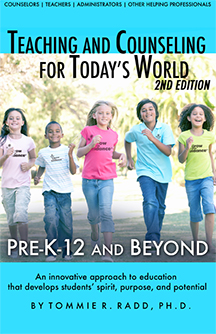 |
Teaching and Counseling for Today’s World: Pre-K-12 (Second Edition)
Essential reading for all! This innovative, easy to read, practical book shows you ways to prepare students with skills needed for life success, present and future. The book includes; 26 concerns facing students and education today; essential elements to consider to address these concerns; models based on the essential elements; formulas for solutions to the concerns based on the models. Meets and exceeds National Model and Program Requirements.
Educational expert Dr. Tommie R. Radd is redefining the way schools worldwide develop guidance and counseling programs, giving students greater odds of achieving life success. In this book, Dr. Radd shares the basis of her work: the framework of dynamic, time-tested guidance system shaped by more than 30 years of practice and research. This team-integrated approach brings teachers, counselors, and behavioral skills to overcome today's biggest challenges.
|
 |
Inviting Education Leadership : Fulfilling Potential & Applying an Ethical Perspective to the Educational Process (School Leadership & Management)
School leaders worldwide are under increased pressure to apply business approaches to their schools. For this to work best schools need to have in place solid defensible educational goals to enhance their educational values which must be maintained and protected. Inviting Educational Leadership shows how to achieve this by successfully understanding and translating business strategies which can be applied to people, places, policies, programmes and processes within a school. This practical book examines the following core subject areas: *leadership -- shows how business approaches can be interpreted educationally *human resources -- looks at the development of human potential *management -- provides examples of successful management strategies *change -- develops a concept of change based upon 'bettering' educational experiences *educational theory -- applies an educational theory of experience *human relations -- describes how to develop good relationships with staff within a school *teacher development -- presents ways teachers can grow through their work *total quality -- interprets total quality in terms of educational experience. |
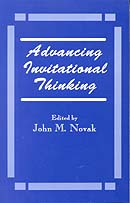 |
Advancing Invitational Thinking (1992)
From the back cover: "The contributors to this book are all practitioners and theoreticians of Invitational Education. Using these working principles, they show how to advance invitational thinking and practice into the areas of self-concept theory, cooperative education, multicultural education, physical education, supervision, administration, adult education, university structure, and counseling. In the process, they provide guideposts for educators seeking innovative and ethically sensitive ways to work with people and bring about democratic change." |
 |
An Invitation to Physical Education
This booklet, which is based on the philosophy of invitational education, focuses on physical education. It is designed to encourage educators to become aware of the messages they send to students; messages that are general and subtle as well as messages that are direct, specific, and personal. This awareness leads to becoming consistently, intentionally inviting. After an introduction, the booklet focuses on: "The Invitational Education Philosophy" (four assumptions of invitational practice and four categories of invitational practice); "The Role of the Inviting Physical Educator"; "Basic Techniques of Invitational Physical Education" (using the power of an invitation, focusing on individuals, collaborating with colleagues, and exercising honesty, responsibility, and persistence); "Invitational Strategies for Physical Education" (creating an inviting physical environment, using effective people skills, making specialized invitations, working on attitude, and involving others); and "Inventory of Physical Education Invitations." The booklet concludes that the principles and strategies of invitational education can transform physical education into a positive, affirming experience for all students. A list of resources is included. (SM) |
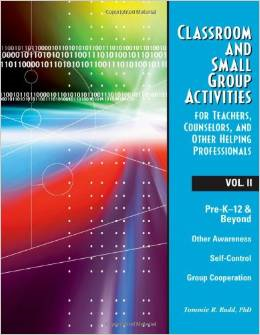 |
Classroom and Small Group Activitiesfor Teachers, Counselors, and Other Helping Professionals Pre-K-12 and Beyond, Volumes 1 and 2.
These guidebooks present classroom and small group activities for Pre-K-12 and beyond. Volume I includes over 250 activities and activity sheets (where appropriate) in the strand areas of Self and Decision Making/Problem Solving. Volume II includes over 250 activities and activity sheets (where appropriate) in the strand areas of Other Awareness, Self-Control, and Group Cooperation. Both volumes are designed for use in areas of the school educational and counseling programs and may be supplements for developmental guidance and counseling programs. (GCP) |
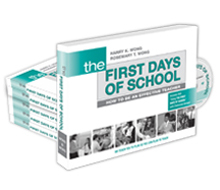 |
First Days of School
Over 3.8 million copies have been sold of the preeminent book on classroom management and teaching for lesson achievement. The book walks a teacher, either novice or veteran, through the most effective ways to begin a school year and continue to become an effective teacher. This is the most basic book on how to teach. Every teacher and administrator needs to have a copy.
The book is used in thousands of school districts, in over 116 countries, and in over 2,026 college classrooms. It’s inspiring and it works.
Included in this 4th edition is a free one hour DVD, “Using THE FIRST DAYS OF SCHOOL” presented by Chelonnda Seroyer. Voted teacher-of-the-year, Chelonnda used this book to transform her classroom into a place of organized learning. Her message details her professional growth and discovery. You’ll laugh, cry, and be proud that you’re a fellow classroom teacher. |
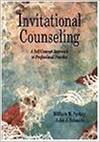 |
Invitational Counseling: A Self-concept Approach to Professional Practice
Founded on the perceptual tradition, self-concept theory, and an emerging view of human development called invitational theory, this book offers a fresh approach for today's counselors. The authors cover the skills and techniques required of the counselor, and they demonstrate the wyas in which the counselor's beliefs and attitudes about people--including trust, respect, optimism, and internationality--are paramount in enabling the client to become his/her best self. |
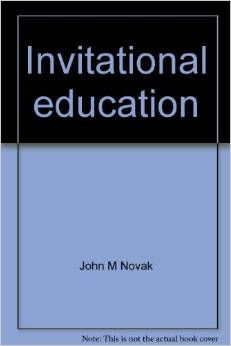 |
Invitational Education (2001)
Invitational education is the process by which people are cordially, creatively, and consistently summoned to realize their potential, emphasizing messages transmitted by people, places, policies, programs, and processes. Based on the democratic ethos, perceptual tradition, and self-concept theory, it offers a perspective for addressing, evaluating, and modifying the total school environment and lets educators assume an invitational stance consisting of five assumptions related to respect, trust, care, optimism, and intentionality. Invitational education must be applied in five areas: people, places, policies, programs, and processes. A four-level classification system describes what occurs in and around schools and provides a starting point for analysis and prescription: intentionally disinviting, unintentionally disinviting, unintentionally inviting, and intentionally inviting. The level of the message depends upon how and why educators do something. Invitational education encourages educators to enrich their lives in four basic dimensions: being personally inviting with oneself and with others and being professionally inviting with oneself and with others. Ten strategies for making invitational education a consistent part of educators' lives include preparing the environment, developing trust, reading situations, and ensuring delivery. Strategies for managing conflict include concern, confer, consult, confront, combat, and conciliate. Strategies for inviting change include the inviting family model and the invitational helix. (Contains 13 references.) (SM) |
| |
Inviting Online Education(2002) |
.png) |
Invitational Learning for counseling and Development (1990)
This monograph describes the theory and practice of the invitational learning model as it applies to school counseling and development. Invitational learning is a paradigm for personal and professional functioning, and for organizational restructuring, based on four values regarding the nature of people and their potential and the nature of professional helping: respect, trust, optimism, and intentionality. Part I of the book develops the theory of invitational learning in five chapters which: define invitational learning (chapter 1); discuss foundations of invitational learning (chapter 2); identify four levels of functioning (chapter 3); explore the five "powerful P's" of places, policies, programs, processes, and people (chapter 4); and explain the "Four Corner Press" of being personally and professionally inviting with oneself and others (chapter 5). Part II surveys the practice of invitational learning through seven essays by separate authors describing their experience in institutions or programs that employ the invitational learning model: (1) "The Baltimore County Guidance and Counseling Experience" (Donald E. McBrien); (2) "The Furman University Center for Excellence Experience" (Judy Lehr); (3) "The East Davidson High School Experience" (Debbie Chance); (4) "The Kansas Elementary School Curriculum Experience" (John H. Wilson); (5) "The Affton School District Experience" (Gary C. Benedict); (6) "The University of South Carolina Adjunct Instructor Experience" (Cheryl French Stehle); and (7) "The Sugar Loaf School Experience" (Joel Blackburn). Forty-eight references are included, and the inviting school checklist is appended, along with an Honor Roll of inviting schools. (TE) |
.png) |
Invitations to Dialogue: The Legacy of Sidney Jourard (1999)
Anyone who speaks to us in such a way that we feel more aware and alive is someone we would do well to seek out. anyone woo encounters us in such a way that we feel more understood, confirmed and excited about our own possibilities as a person is understandably someone we want to remember, celebrate and honor. Without question, Sidney M Jourard was, and remains, that kind of person. Because hi impact was such a meaningful and memorable one and because in so many way his contributions continue to inspire our professional and personal lives, we would like you to know him better. This, in large part, is why we have worked so hard to bring this book into being. _ Anne C. Richards and Tiparat Schlulmrulm, Editors |
 |
Living Intentionally and Making Life Happen
|


OTHERS
|
|
|
|
|
|
|